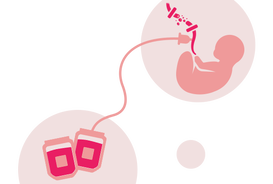Cord Blood Banking
 image from scbb.com.sg
image from scbb.com.sg
What is cord blood? This is the blood that remains in the umbilical cord and placenta after you deliver your baby. This blood is full of stem cells that can help your baby in the future if he/she develops diseases. Cord blood can be useful to treat certain types of cancer, blood disease, and some autoimmune diseases. This blood can also help parents and future children if the blood type matches.
The blood can be stored in one of three ways:
So the big question is should YOU bank your baby's cord blood?
The cons are it is expensive to store the cord blood if you go with a private company. They usually charge a one time collection fee and a yearly storage fee. The cord blood can not treat all diseases, so the chances of your family using the cord blood is slim.
The pros are that if your child did need stem cells this could possibly save your child's life. As each year passes, stem cell therapies have become more successful. This gives your family peace of mind as you wouldn’t have to search for a match or worry about rejection because the cord blood will always match your child. If you decide to go with private banking, then the cord blood is always available for you when you need it and you don’t have to wait long.
I remember asking my doctor what his recommendation would be and this is something I will NEVER forget. "Cord blood banking is like insurance, you never want to use it, but god forbid you had to, its peace of mind to have it." Once he stated it that way my husband and I made our decision.
There are a few private blood banks out there and they all charge different rates and have different capabilities. Some will allow you to save tissue from the cord blood and your placenta (for an additional charge). You just have to choose one that fits with your family and your needs.
Once you choose what bank you want to go with, contact the bank and enroll with them. Shortly after you enroll you will receive a collection kit (depending on your OBGYN and what banks they work with, you may be able to get the collection kit from them). Once you receive the collection kit, keep it with your hospital bag, and let your doctor know that you will be saving the cord blood. I also wrote it in my birth plan just in case I forgot to remind them. On the big day just take the collection kit and give it to the doctor/nurses. Once the cord blood has been collected by the doctor, you will have to call the courier to pick it up and the courier will transport it to the location of your bank. Once the bank receives the cord blood they will test it to make sure they have enough stem cells to store, and they will let you know if they do or do not.
The process is pain free for both mom and baby. The blood can be collected in both vaginal and C-section births.
The blood can be stored in one of three ways:
- Public Cord Banks - these banks do not charge anything to store the cord blood. Any cord blood given is available for anyone who needs it. The cord blood may also be used for research proposes.
- Private Cord Banks - these banks require you to pay to store your baby's cord blood and the cord blood can only be used by the family.
- Direct-Donation Banks - these are a combination of public and private banks. They store both public and private cord blood. There is no fee for this.
So the big question is should YOU bank your baby's cord blood?
The cons are it is expensive to store the cord blood if you go with a private company. They usually charge a one time collection fee and a yearly storage fee. The cord blood can not treat all diseases, so the chances of your family using the cord blood is slim.
The pros are that if your child did need stem cells this could possibly save your child's life. As each year passes, stem cell therapies have become more successful. This gives your family peace of mind as you wouldn’t have to search for a match or worry about rejection because the cord blood will always match your child. If you decide to go with private banking, then the cord blood is always available for you when you need it and you don’t have to wait long.
I remember asking my doctor what his recommendation would be and this is something I will NEVER forget. "Cord blood banking is like insurance, you never want to use it, but god forbid you had to, its peace of mind to have it." Once he stated it that way my husband and I made our decision.
There are a few private blood banks out there and they all charge different rates and have different capabilities. Some will allow you to save tissue from the cord blood and your placenta (for an additional charge). You just have to choose one that fits with your family and your needs.
Once you choose what bank you want to go with, contact the bank and enroll with them. Shortly after you enroll you will receive a collection kit (depending on your OBGYN and what banks they work with, you may be able to get the collection kit from them). Once you receive the collection kit, keep it with your hospital bag, and let your doctor know that you will be saving the cord blood. I also wrote it in my birth plan just in case I forgot to remind them. On the big day just take the collection kit and give it to the doctor/nurses. Once the cord blood has been collected by the doctor, you will have to call the courier to pick it up and the courier will transport it to the location of your bank. Once the bank receives the cord blood they will test it to make sure they have enough stem cells to store, and they will let you know if they do or do not.
The process is pain free for both mom and baby. The blood can be collected in both vaginal and C-section births.
|
|
|
